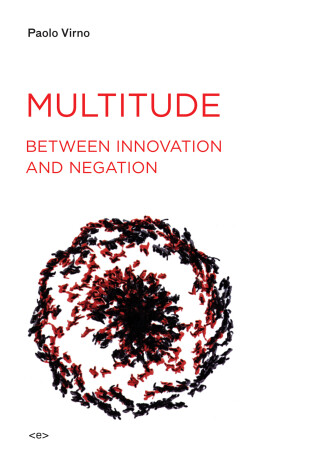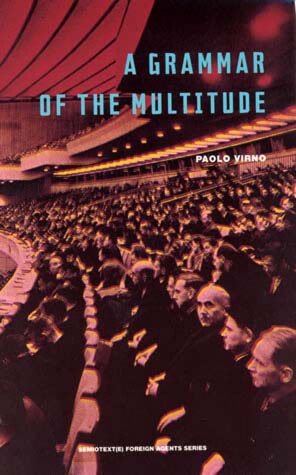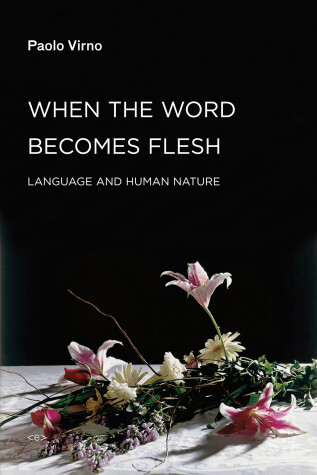Semiotext(e) / Foreign Agents
3 total works
Multitude between Innovation and Negation by Paolo Virno translated by James Cascaito. The publication of Paolo Virno's first book in English, Grammar of the Multitude, by Semiotext(e) in 2004 was an event within the field of radical political thought and introduced post-'68 currents in Italy to American readers. Multitude between Innovation and Negation, written several years later, offers three essays that take the reader on a journey through the political philosophy of language. “Wit and Innovative Action” explores the ambivalence inevitably arising when the semiotic and the semantic, grammar and experience, rule and regularity, and right and fact intersect. Virno unravels the infinite potential and wonders of everyday linguistic praxis and ambiguity. Wit, he argues, is a public performance, and its modus operandi characterizes human action in a state of emergency; it is a reaction, an articulate response, and a possible solution to a state of crisis. “Mirror Neurons, Linguistic Negation, and Mutual Recognition” examines the relationship of language and intersubjective empathy: without language, would human beings be able to recognize other members of their species? And finally, in “Multitude and Evil,” Virno challenges the distinction between the state of nature and civil society and argues for a political institution that resembles language in its ability to be at once nature and history. Few thinkers take the risks required by innovation. Like a philosophical entrepreneur, Virno is engaged in no less than rewriting the dictionary of political theory, an urgent and ambitious project when language, caught in a permanent state of emergency impossible to sustain, desperately needs to articulate and enact new practices of freedom for the multitude. Paolo Virno is the author of several books, including A Grammar of the Multitude (Semiotext(e), 2004).
Italian political thinker Paolo Virno argues that the category of "multitude" is a far better tool to analyze contemporary issues than the Hobbesian concept of "people."
Globalization is forcing us to rethink some of the categories-such as "the people"-that traditionally have been associated with the now eroding state. Italian political thinker Paolo Virno argues that the category of "multitude," elaborated by Spinoza and for the most part left fallow since the seventeenth century, is a far better tool to analyze contemporary issues than the Hobbesian concept of "people," favored by classical political philosophy. Hobbes, who detested the notion of multitude, defined it as shunning political unity, resisting authority, and never entering into lasting agreements. "When they rebel against the state," Hobbes wrote, "the citizens are the multitude against the people." But the multitude isn't just a negative notion, it is a rich concept that allows us to examine anew plural experiences and forms of nonrepresentative democracy. Drawing from philosophy of language, political economics, and ethics, Virno shows that being foreign, "not-feeling-at-home-anywhere," is a condition that forces the multitude to place its trust in the intellect. In conclusion, Virno suggests that the metamorphosis of the social systems in the West during the last twenty years is leading to a paradoxical "Communism of the Capital."
Originally published in Italian in 2002, When the Word Becomes Flesh provides a compelling contribution to the understanding of language and its relation to human nature and social relationships. Adopting Aristotle's definition of the human being as a linguistic and political animal, Paolo Virno frames the act of speech as a foundational philosophical issue—an act that in its purely performative essence ultimately determines our ability to pass from the state of possibility to one of actuality: that is, from the power to act to action itself. As the ultimate public act, speech reveals itself to be an intrinsically political practice mediating between biological invariants and changing historical determinations. In his most complete reflection on the topic to date, Virno shows how language directly expresses the conditions of possibility for our experience, from both a transcendental and a biological point of view.
Drawing on the work of such twentieth-century giants as Ferdinand de Saussure, Ludwig Wittgenstein, Edmund Husserl, and Gottlob Frege, Virno constructs a powerful linguistic meditation on the political challenges faced by the human species in the twenty-first century. It is in language that human nature and our historical potentialities are fully revealed, and it is language that can guide us toward a more aware and purposeful realization of them.


